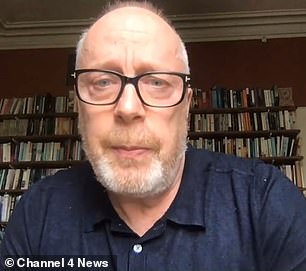
Professor Stephen Reicher warned Britons should not be forced back to the office
Britons should be allowed to continue working from home rather than being forced back into the office, one SAGE adviser claimed today.
Professor Stephen Reicher claimed the number of people someone comes into contact with every day had risen to its highest level this year.
He said this was driven by people being ‘required to go back to work’ and was not down to millions of adults ‘partying all the time’.
Professor Reicher warned this increased mixing the likelihood of someone coming into contact with another person who had the virus, running the risk of another surge in Covid cases.
It comes after a consensus statement from the Scientific Pandemic Influenza Group on Modelling operational sub-group (SPI-M-O) claimed there is still ‘the potential for another large wave of hospitalisations’ as the pandemic continues.
The SAGE sub-panel said: ‘There is a clear consensus that continued high levels of homeworking has played a very important role in preventing sustained epidemic growth in recent months.
‘It is highly likely that a significant decrease in homeworking in the next few months would result in a rapid increase in hospital admissions.’
Boris Johnson lifted guidance to work from home where possible on ‘Freedom Day’ July 19, and workers have trickled back to offices since.
Unveiling his winter Covid plan at a Downing Street press conference yesterday, the Prime Minister warned that the measure could be brought back should vaccines fail to keep the lid on the virus.
Furious pubs, shops and small businesses blasted the plans, and experts warned the move this winter could cripple the economy.
SAGE scientists have also called for a return to the ‘pingdemic’, should cases spiral out of control again and the NHS come under serious pressure.
In advice submitted to ministers last week — but only published yesterday — they recommended isolating all close contacts of cases, regardless of their vaccination status, in the event of an uptick in cases.
The quarantine rules sparked chaos over the summer after forcing millions into self-isolation, leaving supermarket shelves empty and pubs shut.
The Government scrapped the measures for fully-vaccinated adults and children in August, in hope of finally ending the chaos.
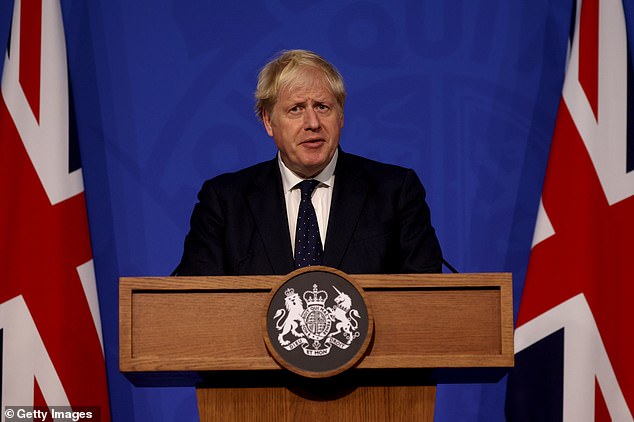
Boris Johnson dumped work from home guidance in July. But in a Downing Street press conference last night (pictured) he warned it could be brought back this winter


The number of patients being admitted to hospital with Covid could rise to 7,000 a day within weeks, the Government’s scientific advisers warned in a gloomy prediction

The predicted total is worse than last year and seven times that of the latest figures – which show the number admitted in England was just 1,009
Professor Reicher, who is a member of SAGE advisory group the Scientific Pandemic Insights Group on Behaviours (SPI-B), said the mass return to work risked sparking an uptick in Covid cases.
The University of St Andrews’ expert told Times Radio: ‘In the last couple of weeks, people have started mixing more.
‘The rate at which we mix, the number of contacts we have per week, has gone up to 5.3, the highest for a year.
Sajid Javid warns there could be another lockdown this winter if Covid hospitalisations take off — and SAGE calls for the return of the ‘pingdemic’
Sajid Javid today doubled down on the Government’s warning that another lockdown could be needed if the Covid crisis gets out of hand this winter.
The Health Secretary claimed it would be ‘irresponsible’ to rule out the intervention completely, but said he was optimistic it won’t be necessary because of the vaccine effect.
It came after it was revealed SAGE scientists had called for the return of the ‘pingdemic’ should the virus spiral out of control.
In advice submitted to ministers last week — but only published yesterday — they recommended isolating all close contacts of Covid cases, regardless of vaccination status.
The Government only scrapped the rule for fully-jabbed people this summer, after shops and hospitality businesses were forced to close because so many staff members had been ‘pinged’ by the NHS app and were self-isolating.
A SAGE adviser said today that the pindemic could have prevented cases soaring to 100,000 a day.
It follows Boris Johnson’s warning last night that a lockdown would be a ‘last resort’ Plan B and only used if the NHS is in danger of being overwhelmed in winter.
Mr Javid, who is much more of a ‘hawk’ than his predecessor Matt Hancock, said he wanted to avoid a lockdown because of its detrimental effects on cancer and other health conditions.
Advertisement
‘But when you look more closely, what you find is nearly all of that is due to people mixing at work — a 63 per cent increase — and virtually none to do with meeting in the home and with socialising.
‘So, the problem isn’t that people are choosing to party all the time, the problem is people are given no choice because they are required to go back to work.’
He added: ‘That’s why it would make sense for people to work at home if they can, and if they want to, to avoid presenteeism, forcing people to go in.’
Professor Reicher called for the Government to bring in measures earlier rather than later to control the pandemic.
‘We’re talking about… giving people the support they need in order to be able to self-isolate and so on,’ he said.
‘It’s only if you let things get out of control, and only if you have incredibly high rates and need to slam the brakes on, that’s when lockdown comes in.’
Professor Andrew Hayward, who sits on SAGE, echoed his words today saying that working from home would ‘make a significant difference’ to the spread of the virus.
He told BBC Radio 4’s Today programme: ‘The most important and effective way of reducing spread of the virus is not to be in contact with other people.’
Business leaders yesterday welcomed ‘Plan A’ of Boris Johnson’s winter plan, but warned the alternative would have ‘significant and drastic impacts’.
UKHospitality Chief Executive Kate Nicholls said: ‘It’s critical for the recovery of the hospitality sector and the wider economy that businesses are allowed to continue to operate in viable conditions throughout this winter.
‘Hospitality venues are still in a fragile state with significant debts, making their first steps on the road to recovery and rebuilding broken balance sheets, any setbacks over the coming months will result in more businesses closures.’
Alan Thomas, UK CEO at Simply Business, one of the UK’s largest providers of small business insurance, said: ‘Small business owners will be breathing a sigh of relief knowing the Prime Minister is looking to avoid any further lockdowns.
‘Another lockdown would have a devastating impact on small businesses. Half (48 per cent) of all owners live in fear of future restrictions, and thousands would be put out of business – with almost one in six (15 per cent) saying they’d have to cease trading altogether if we were placed into another lockdown.’

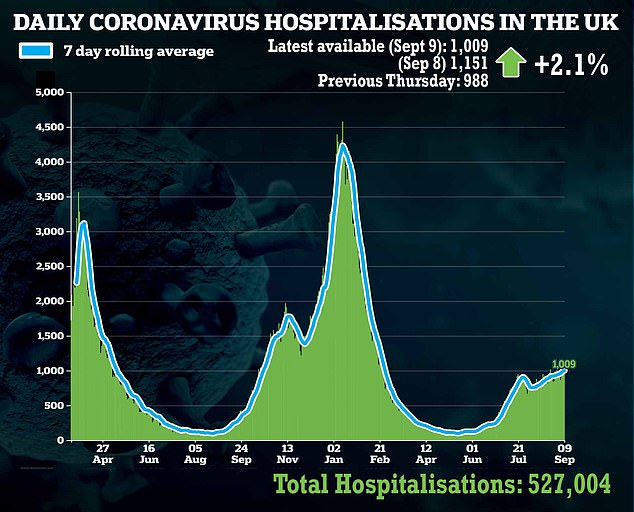
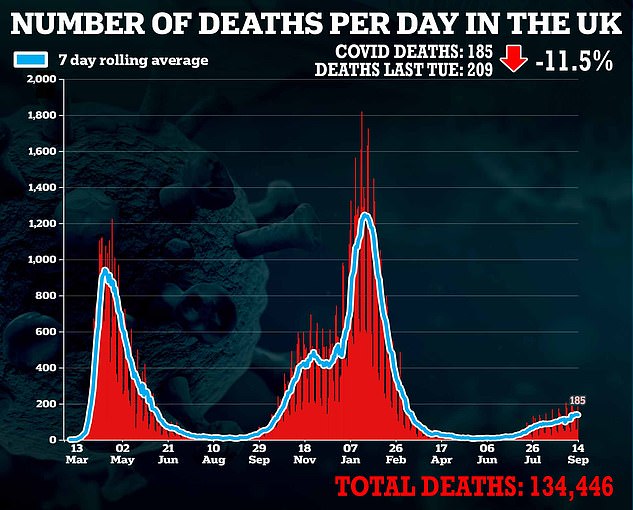
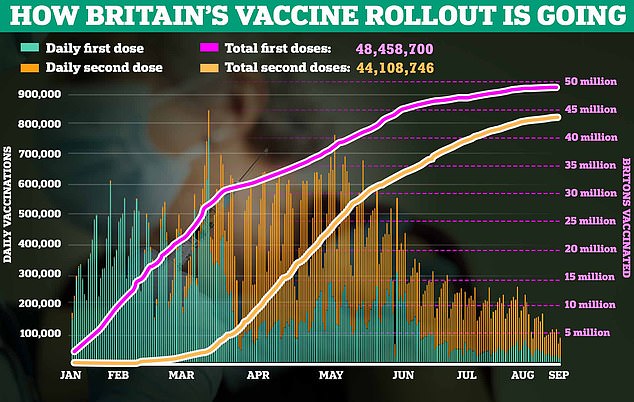
It came after it was revealed SAGE scientists had called for the return of the ‘pingdemic’ should the virus spiral out of control.
In advice submitted to ministers last week — but only published yesterday — they recommended isolating all close contacts of Covid cases, regardless of vaccination status.
The Government only scrapped the rule for fully-jabbed people this summer, after shops and hospitality businesses were forced to close because so many staff members had been ‘pinged’ by the NHS app and were self-isolating.
SAGE adviser Professor Graham Medley said today that the NHS app could have prevented as many as 10,000 cases a day.
Experts predicted that cases could spiral to this level over the summer after restrictions were eased, but this never materialised.
The member of the Scientific Pandemic Influenza Group on Modelling (SPI-M) said the pingdemic may have contributed to cases flatlining after restrictions eased as networks of transmission were ‘broken’.
Asked about the prediction of case numbers over summer, he said: ‘The pingdemic may well have played quite a role in that, in the sense of it asked people to isolate not if they were infected but if they had been in contact with someone who was infected and, as a result, those people who then isolated were at lower risk of infections.
‘So, that may well have had a role in terms of breaking up the networks along which Covid was transmitting at that point.’
Source link : https://www.dailymail.co.uk/news/article-9993059/SAGE-adviser-says-workers-shouldnt-forced-office.html











